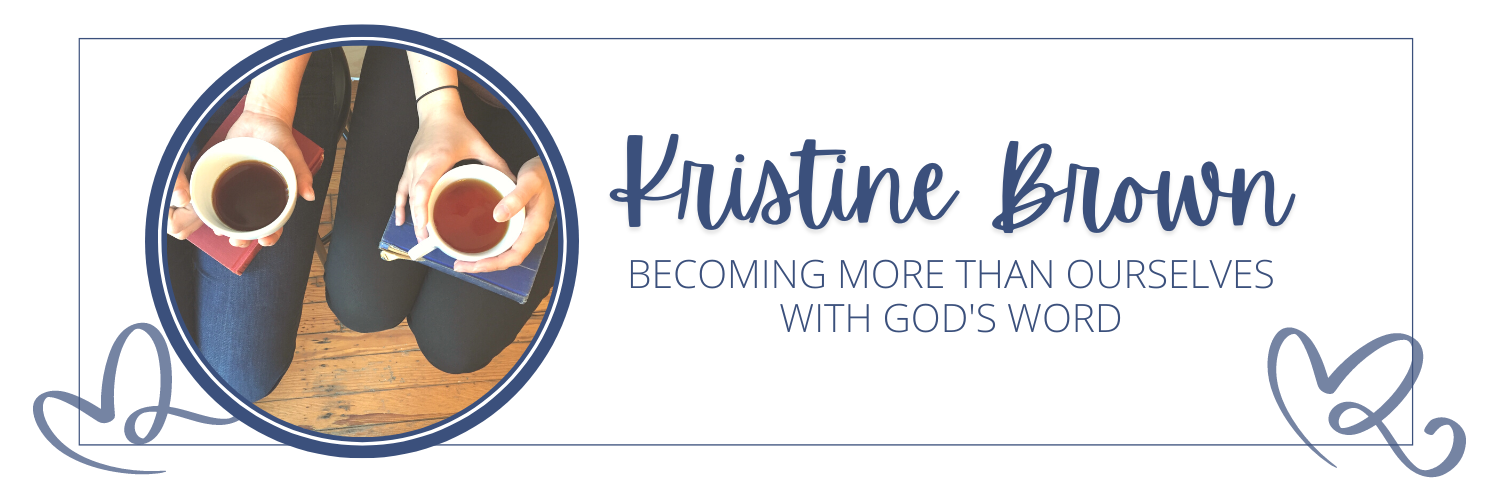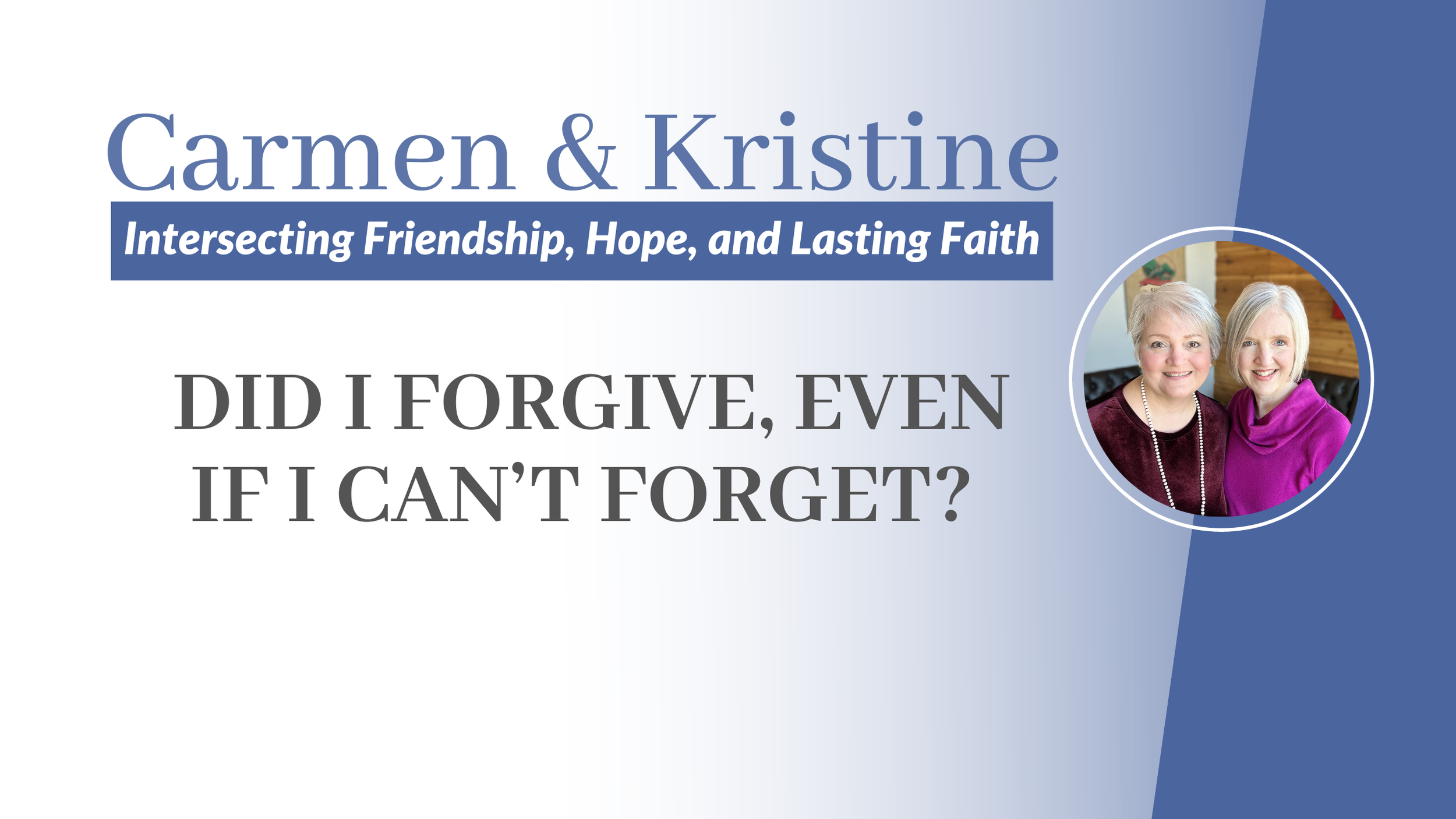The following post is an edited transcript of the video version of Kristine & Carmen’s episode titled, “Did I Forgive, Even Though I Can’t Forget?” You can view the video conversation here:
Did I really forgive the person if I’m not able to forget? Sometimes memories of past pain pop up suddenly. I can be walking down the aisle at the grocery store, see a person who hurt me, and all those feelings start flooding back. I want to avoid them, so I speed to the next row so that I can avoid facing them.
I understand the need for forgiveness, and I believe God wants us to forgive. His Word shows us this in Colossians 3:13, “Make allowance for each other’s faults, and forgive anyone who offends you. Remember the Lord forgave you, so you must forgive others.”
But where I struggle is, how do I know if I’ve really forgiven? When those memories come flooding back, I feel the familiar anger and bitterness returning. Does that mean I didn’t really forgive the person?
What the Bible Says About Forgiving and Forgetting
Many of us have heard the familiar phrase, “Forgive and forget,” but is it even possible?
My co-host Carmen Horne encourages us with this truth: One of the great benefits of our salvation is that Jesus chooses to forget our sins. He separates our sins from us as far as the east is from the west.
“He has removed our sins as far from us as the east is from the west.” (Psalm 103:12)
Carmen goes on to say that we can take comfort in knowing our memories are not like a computer hard drive where we can wipe those things out. (You can hear the audio version of this episode on the podcast here.)
We have our memories, and that’s okay. God created us that way. He calls us his masterpiece. He said the day he created Adam and Eve was a good day, so we can have peace knowing God doesn’t expect us to forget.
It’s what we do with our memories that matters.
The Relationship Between Taking Our Thoughts Captive and Forgiveness
In a previous episode, we talked about the importance of taking our thoughts captive and ways to do that. There are so many situations that can trigger us; or in other words, remind us of the hurt we went through. Those things can ambush us. When they do, we need to pause, give ourselves a talk, and remind ourselves that we chose to forgive the offense.
It can also help to offer ourselves grace through the process.
Because it’s easy to entertain bad memories when they try to take over. I can sense bitterness starting as a small seed and beginning to grow. When bitterness tries to take root and I question whether I’ve really forgiven, here are the first two steps in applying the daily discipline of taking my thoughts captive.
Step one: Recognize the bitterness when it happens, and praise God that I’m able to recognize it.
Step two: Take control of that thought by reminding myself who God is.
Once I deal with those thoughts, I will be able to resist the lie that says I haven’t forgiven, just because I can’t forget what happened.
In Psalm 25, David gives us a beautiful example of forgiveness that relates to how I’m able to forgive in my life today. In Psalm 25:11, David says, “For the honor of your name, o Lord, forgive my many, many sins.” But just before he asks God to forgive him, he proclaims the goodness of God’s character.
“Remember, O Lord, your compassion and unfailing love, which you have shown from long ages past. Do not remember the rebellious sins of my youth. Remember me in the light of your unfailing love, for you are merciful, O Lord.” (Psalm 25:6-7)
Our lives are messy. We’ve made mistakes in our past, and there’s nothing we can do in our own strength to fix that. I can sometimes think that forgetting is something I need to do, and by forgetting, I’m taking action to show God (and myself) that I’ve forgiven. But David shows us a better way. He points out God’s character. He asks God not to remember him because of his faults but in light of who God is. So when we’re tempted to question if we’ve forgiven, we can apply this truth from David’s example.
God’s forgiveness is not available to us because of our actions but because of his character.
Because God forgives, I forgive. And God will help me through my struggles with the bad memories.
When we want to be mad, and we want someone to pay for our hurts, we have the power to take those thoughts captive and make the daily choice to forgive. Not by our own strength, but because of an amazing, loving God.
How We Feel About Forgiving but not Forgetting
When memories resurface from past hurt, it stinks. It feels awful. The pain can be recent and raw, or it can return unexpectedly after a long time.
Either way, it’s okay to feel that pain. Part of taking our thoughts captive is getting to the place where we can say, “Lord, somehow you are going to use this. I give this unbearable pain to you.”
Carmen reminds us once again that we have hope in this: Just because we have memories of something bad that happened to us doesn’t mean we haven’t forgiven that person. Praise God that he will guide us as we process what we can’t forget!
Forgiveness is not only a choice, but it is supernatural. We can release the burden of forgetting as we take our hurts to the Lord. Each time a memory of past hurt returns, we have the opportunity to learn, grow in his grace, and allow God to help us work through those memories to live the abundant life he gives.
Pin this post!












